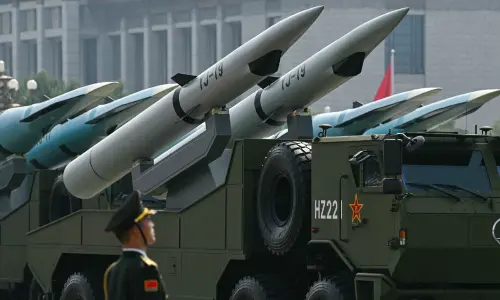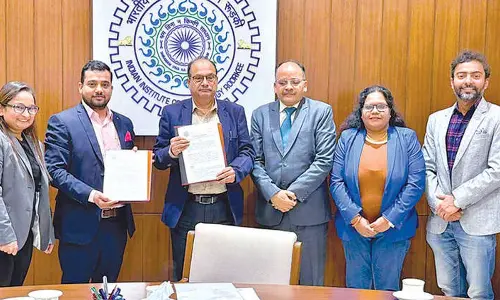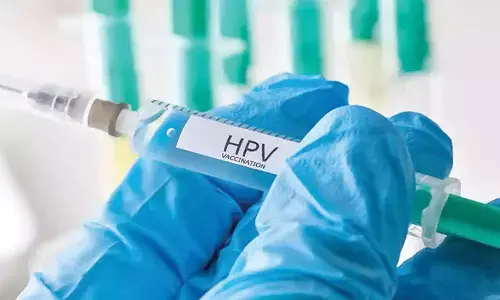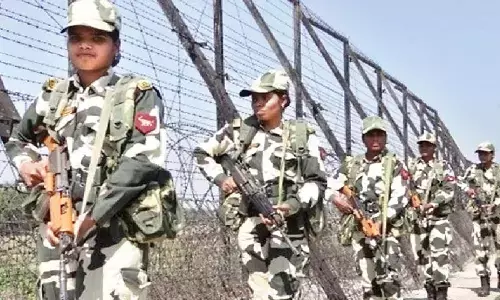Frame nat’l policy to combat drugs
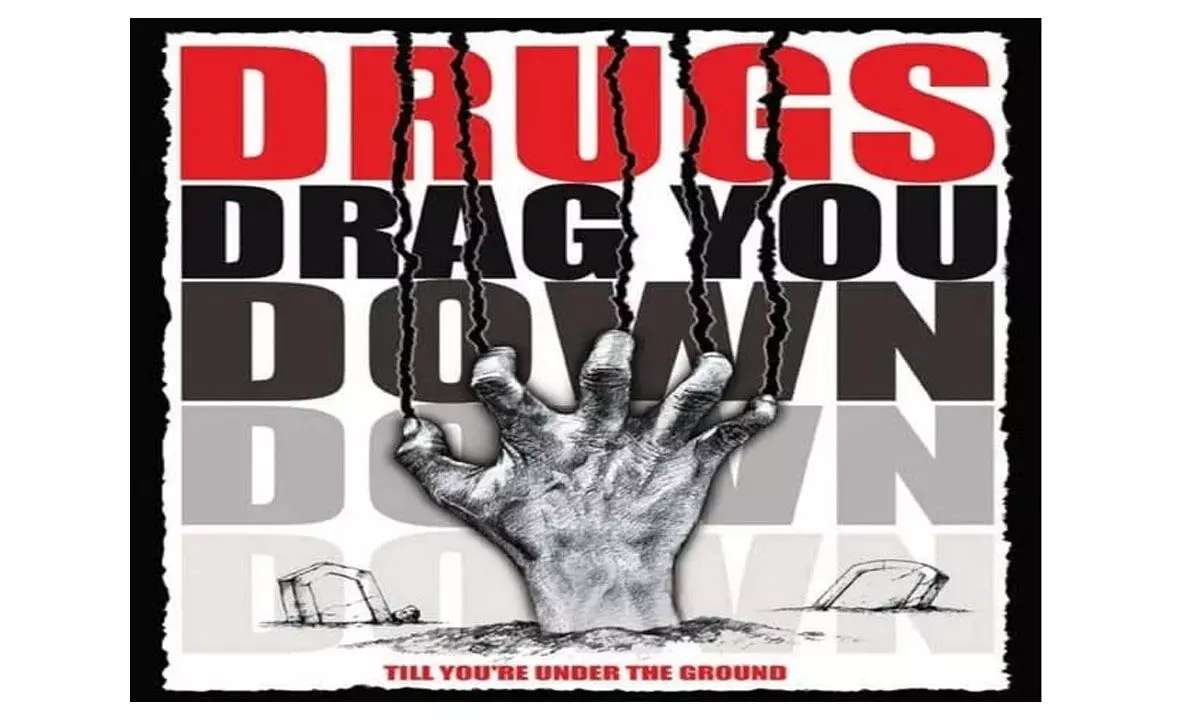
Apart from the Narcotics Control Bureau (NCB), various agencies like the DRI, Customs, BSF, state police forces, state excise authorities etc., have been empowered and entrusted with the prevention and suppression of drug trafficking.
Apart from the Narcotics Control Bureau (NCB), various agencies like the DRI, Customs, BSF, state police forces, state excise authorities etc., have been empowered and entrusted with the prevention and suppression of drug trafficking. Can this by itself prevent the inflow or manufacture of prohibited narcotic drugs and psychotropic substances?
It is a well documented fact that the illicit supply of narcotic drugs and psychotropic substances either through illicit drug trafficking or domestic manufacture would depend on the extent and the kind of drugs in illicit demand within each national jurisdiction. For this, it is necessary to identify the states in which the illicit demand for drugs is endemic and the type of drugs abused. In some of the states in India, epidemiological surveys have been conducted to determine the size and extent of the problem. Information could also be collected from hospitals, drug treatment centres, state police authorities, administrators of schools and colleges, hostels, boarding houses, etc. Evaluation of such data would give valuable inputs in formulating an action plan for prevention of future and vulnerable sections of the population, treatment of drug addicts and identifying the source of supply.
While gathering such information, it is not difficult to ascertain the source of supply, though initial information may be only in respect of drug peddlers. It is also possible to ascertain whether such drugs are being supplied from a local manufacturing facility or being smuggled through the sea, land or airports. It is also necessary to identify and destroy illicit cultivation of cannabis and illicit cultivation of opium poppy. Drones can be used to locate and identify the places where illicit cultivation of Cannabis and Opium Poppy is done. Based on the information gathered, eradication and destruction of such illicit cultivation can be undertaken, which was done in the past by the NCB in the dense forests at high altitudes of Kambakkal Hills of Kerala. In the case of illicit cultivation of opium poppy, particularly in hilly areas of Uttarakhand, Arunachal Pradesh, and some of the North Eastern States, it is more as a source of income rather than as a source for smuggling. It may, therefore, be necessary to persuade such farmers to undertake crop substitution and wherever it is felt that it is appropriate it may be necessary to provide financial assistance to such farmers as part of social cost in preventing production of harmful drugs.
In India, we have noticed that some of the pharmaceutical factories are manufacturing Mandrax, (the active ingredient being Methaqualone), MDMA (Methamphetamine / Ecstasy), Ephedrine, etc. As far as smuggling of drugs through international frontiers is concerned the Customs, the BSF and DRI have a major role to play to intercept and prevent the supply. Once they escape the Customs, it is the jurisdictional police who should take the initiative to detect and neutralise such drug traffickers. They should bear in mind that there is close correlation between drug abuse, drug trafficking, money laundering and organized crime.
Such a national policy amongst other initiatives may include, addition in the course content for certain courses so as to address and motivate and prevent the youth and younger generation not to become victims of drug abuse. The courses where the content is required to be amplified should broadly cover the following topics: How to motivate not to become victims due to peer pressure; Not to experiment with drugs of abuse, as casual users, particularly psychotropic substances, like MDMA (Methamphetamine), Cocaine, LSD; mechanics or engineers assembling machines or fixing machines or equipment; Causing disharmony within a family; Preventing propensity to commit crime to pay for the dugs needed for the next dose or for being supplied to his group, etc.
Some of the courses where the curricula, in addition to the regular subjects, required to be amplified are: MBBS and Post graduate courses in medicine; Master’s Degree in Social Work (MSW); Bachelor’s Degree in Education; M.A. Psychology; B. Pharm and M. Pharm; LL.B; Labour Welfare Laws and Courses on Human resources; M.A. (Economics) with particular reference to economic costs to society as a result of drug abuse by a section of the population; In the Foundation and Specialized Courses, conducted at LBS National Academy of Administration, Mussoorie; SVP National Police Academy, Hyderabad; National Academy of Customs, Indirect Taxes and Narcotics, Palasamudram, AP, and state police academies.
Scholars and students who had the advantage of studying courses on prevention of drug abuse can become not only agents of change but can motivate others to take up similar programmes in schools, colleges and community programmes. Schools and colleges would be an ideal place for creating awareness and consequences of drug abuse.
Of late it has been noticed that steroids, amphetamines, erythropoietin, etc., are some of the drugs sports persons and athletes take to improve their performance least realizing the negative effects on their metabolism and behavior patterns. Institutions like the Sports Authority of India (SAI) should be involved in briefing sport persons of the harmful consequences of drug abuse.
While dealing with the target groups, we should keep in mind that it is fairly common amongst the student population who are normal, without any stress or dysfunction, experimental and occasional use of drugs should not be treated as deviant behavior and such groups can by proper counseling can be weaned away from becoming addicts.
It would be necessary to identify drug abuse by individuals in a wide range of sensitive occupations particularly in large organizations involved in the manufacture of sensitive goods or carrying out sensitive occupations. Some examples which come to my mind are doctors performing surgeries, equipment manufacturers where any parameters not properly fixed may result in disasters, personnel in the armed forces where decisions have to be taken instantly based on the developments, pilots flying aircraft including fighter jets, drivers of trains, vehicles, etc.
It may be necessary to sensitize in work places the harmful consequences that may happen with drug abuse, in terms of performance, accidents, disasters, loss of life and property, etc. For this periodically the top management of the organization should arrange programmes where speakers can motivate the employees not to become victims of drug abuse and if possible help those employees who have become victims of drug abuse by referring them to treatment centers for their recovery and rehabilitation.
The help of some NGOs can also be taken in the prevention programmes. For example, in Nagaland, the Naga Mothers Association and some of the Church Organizations, e.g., Shalom Rehabilitation Centre in Kohima, Sneha Bhawan, in Manipur in the North Eastern States assisted by Kripa Foundation are said to be doing commendable work. Kripa Foundation has set up centers in other places, (Mumbai, Hyderabad, Mangalore, etc) and is helping victims of substance abuse, in de-addiction and their rehabilitation. In Chennai, the TT Ranganathan Clinical Research Foundation has been doing excellent work in the treatment and rehabilitation of alcoholics and drug addicts. Similar programmes can also be undertaken by religious and charitable institutions.
Narcotic drugs and Psychotropic substances are being sent through local and international mails. It is necessary to use sniffer dogs and X-Ray equipment to detect such postal articles. Wherever possible if such postal articles are delivered at the address given, even the recipient can be identified, if the address is genuine. Further, the methodology adopted for payment can also be found out. Seizure, freezing and forfeiture of property of drug traffickers has a salutary effect on drug trafficking organizations.
As part of the national policy, it is also necessary to consider the decriminalization of use of certain drugs like cannabis for personal use and the emphasis should be on treatment rather on prosecution. Such an approach will minimize the other harmful consequences such as: Stigmatization of the addict; Acceptance that addiction is a problem, help and facilitate the users to undergo treatment; Draw away users from the criminal network to secure the drugs for further abuse; Reduction in the cost of conducting prosecution, incarceration, effect on the family and social cost.
(Writer is Former DG NCB, DG DRI and Member, CBIC (Retd))


